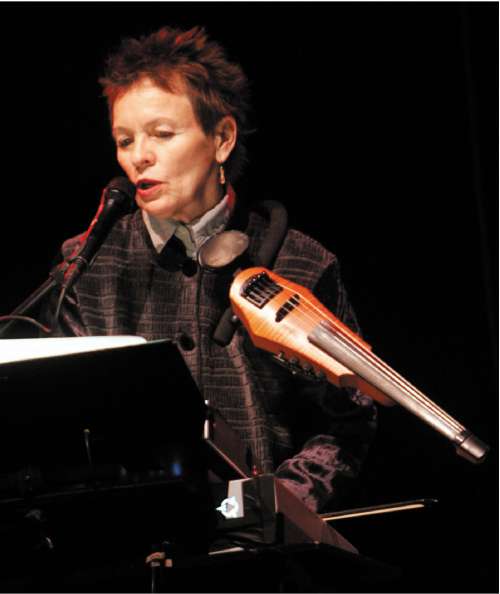Laurie Anderson's anti-American attitude sparks walkout

Your support helps us to tell the story
From reproductive rights to climate change to Big Tech, The Independent is on the ground when the story is developing. Whether it's investigating the financials of Elon Musk's pro-Trump PAC or producing our latest documentary, 'The A Word', which shines a light on the American women fighting for reproductive rights, we know how important it is to parse out the facts from the messaging.
At such a critical moment in US history, we need reporters on the ground. Your donation allows us to keep sending journalists to speak to both sides of the story.
The Independent is trusted by Americans across the entire political spectrum. And unlike many other quality news outlets, we choose not to lock Americans out of our reporting and analysis with paywalls. We believe quality journalism should be available to everyone, paid for by those who can afford it.
Your support makes all the difference.It may be three decades since Laurie Anderson reached No. 2 in the UK singles chart with her eight-minute experimental epic "O, Superman"– which was a haunting indictment of Cold War American foreign policy – but the New Yorker reminded British audiences this week that she has lost none of her radical fire.
A performance of her latest show, Homeland, at the Barbican in London on Thursday prompted a walkout by some audience members who were enraged at her criticism of her fellow Americans and over her condemnation of the US invasion of Iraq.
Anderson has also been making headlines because of her recent marriage to her partner, Lou Reed. The couple have been together since the late 1990s.
In her Homeland show, she is accompanied by a trio of male musicians and addresses the Iraq war, a subject she feels is "taboo" in the US. She also discusses the state of a nation dominated by "the underwear gods" of billboard advertising and populated by the obese.
Her 1981 hit, "O Superman" was inspired by the aria "O Souverain" from Massenet's Le Cid, and tackled the US hostage crisis in Iran. "It's pretty much the same conflict and many of the same issues are around, except now it's more difficult to criticise," she said. "Most of our money goes on that war. Is that really a good use of our resources? The stakes are quite high, so I think it's worth talking about."
In March, Anderson and Reed joined forces with singers including Antony Hegarty from Antony and the Johnsons, the Scissor Sisters, Norah Jones, Damien Rice and David Byrne as well as writers and thinkers such as Naomi Klein for Speak Up! a benefit concert for peace in Iraq.
"Even if Americans oppose the war, what are they actually doing about it? We gave them somewhere to come," she said.
Explaining the title of her latest work, Anderson said: "Homeland is a sentimental, fuzzy word, but it's partnered with security, which is a very cold, bureaucratic word."
She believes her show is particularly relevant in the UK, where it finishes at the Barbican tonight, before travelling to Norwich and Salisbury, because it discusses "what it's like to work in a culture where surveillance is becoming more dominant".
Enjoy unlimited access to 100 million ad-free songs and podcasts with Amazon Music
Sign up now for a 4 month free trial (3 months for non-Prime members)
Enjoy unlimited access to 100 million ad-free songs and podcasts with Amazon Music
Sign up now for a 4 month free trial (3 months for non-Prime members)
Last month, Anderson married Reed in a ceremony in Colorado. "I was just walking down a street in California and I was talking to Lou, and we were always talking about getting married, and he said 'how about tomorrow? It was very nice. It was just him and me under a tree."
Born in Chicago in 1947, Anderson first came to prominence as an avant-garde artist in New York in the 1970s, experimenting with sound and music. She still lives in the city in a sixth floor loft studio in downtown Manhattan. As well as playing the violin and keyboard and singing, she became known for the ingenious electrical devices she invented, such as a violin with a magnetic tape head on the bow.
Her body of work has encompasseding film and multimedia projects as well as music and she has collaborated with artists including William Burroughs, Brian Eno and Jean-Michel Jarre. In 2003, she became the first and so far only artist-in-residence at Nasa, leading to the creation of a performance piece, The End of the Moon.
Join our commenting forum
Join thought-provoking conversations, follow other Independent readers and see their replies
Comments